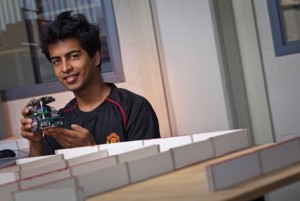
Nripesh Parajuli '11
Before arriving on College Hill, Nripesh Parajuli ’12 (Chitwan, Nepal) knew he wanted to be an engineer; he just didn’t know what kind. After taking computer science and basic analog circuit courses his first year, he was hooked on electrical and computer engineering.
Parajuli explored the discipline that is “fun but continues to challenge my abilities” through summer research with John Greco, professor of electrical and computer engineering. He programmed a microcontroller to enable a small robot called a micromouse to successfully navigate a maze. With the controller chip mounted on top of it, the mouse had LEDs, sensors, and servo motors that Parajuli had to program to enable movement.
The program Parajuli created tracked the mouse’s location as well as the orientation of the barriers surrounding it at any given moment. Once the mouse finds its way through the maze the first time, it can determine the best path in the future. Also, the program Parajuli designed can collect any data the mouse gathers by connecting the mouse to a computer running the program. The technology used in the mouse is similar to that of unmanned vehicles used in a variety of civilian and military applications.
Parajuli was taking a digital circuits class with Greco and approached his professor about getting involved in a summer project, an opportunity he doesn’t think he’d have at a larger university.
“It would have certainly been very hard for me to obtain a research opportunity like this if I was going to a school with 10,000 students with half of them being graduate students,” he says. “My professor was always available to help me out with problems that I ran into. I had a big lab for myself and very easy access to all the equipment I needed.”
Greco, who praises Parajuli’s “excellent ability to work independently, working around problems by trying different approaches,” says EXCEL Scholars projects such as this one enable students to take typical classroom experiments a few steps further.
“Although we include meaningful project work in our courses with laboratories, the EXCEL program allows a student to work on a more advanced project that draws on knowledge learned in classes and illustrates its applications beyond the level normally seen by students,” he says.
Parajuli even had the opportunity to share his work with the next generation of college students when Ismail Jouney, Charles A. Dana Professor and head of electrical and computer engineering, asked him to demonstrate the mouse for local middle and junior high school students visiting the engineering labs.
“It was a really amazing experience,” says Parajuli, who plans to work in the field before attending graduate school. “They asked me very interesting questions and told me they would love to do something like this in the future as they found my project really cool. It was a great pleasure to watch the kids draw some inspiration from my work.”
